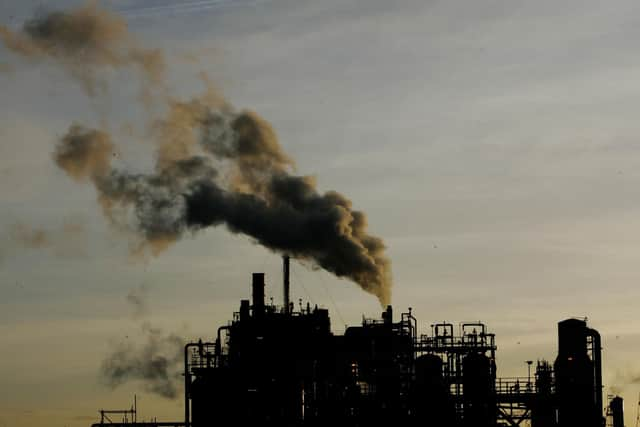Grangemouth: Scotland's only oil refinery could shut as early as spring 2025 as hundreds of jobs at risk
Scotland’s only remaining oil refinery is expected to shut from as early as spring 2025 in a decision that could lead to the loss of hundreds of jobs.
The refinery, close to Falkirk, is responsible for four per cent of Scotland’s GDP and eight per cent of its manufacturing base. It currently employs more than 500 staff and processes 39 million barrels of crude oil, a year – more than a third of that extracted from the North Sea.
Advertisement
Hide AdAdvertisement
Hide AdThe facility, which is a joint venture between Ineos and PetroChina, would be converted into an import terminal under the plans, which would see it import petrol and diesel and distribute around Scotland.


It is believed some jobs could transfer to other parts of the business when the transition is complete, but exact numbers are not known.
The original Grangemouth refinery was established in 1924 and was one of the first crude oil refineries in the UK. It now remains Scotland’s only oil refinery.
An email sent to staff by refinery manager Russell Mann said: “We anticipate that works necessary for import flexibility at Finnart and Grangemouth will take around 18 months to complete and our current intention is to continue refinery operations until spring 2025, and potentially beyond.”
He added: “We will shortly begin work to modify our infrastructure so we can, if necessary, operate as a fuel import and distribution terminal at Grangemouth.
“This investment will future-proof our business, enhance the site’s resilience, and secure our status as a national fuel hub for decades to come.”
Alex Kemp, professor of petroleum economics and director of Aberdeen Centre for Research in Energy Economics and Finance at the University of Aberdeen, warned of the financial impact on Scotland of the closure.
"It [GDP generated from Grangemouth] would be very much less,” he said. “There will be no processing and that's where all the value added is and where all employment is because these refineries operate 24 hours per day, 365 days a year.”
Advertisement
Hide AdAdvertisement
Hide AdHe added: “It's a big employer. And when you look at, not just the people directly employed there, but also supply chain people as well, we are talking about quite big numbers.”
Unions urged for hundreds of “highly skilled jobs” to be retained.
Gary Smith, GMB general secretary, said: “This is a deeply worrying time for the future of the workers and communities dependent on Grangemouth.
"The intention to transition from domestic production to a fuel import terminal poses serious questions about the UK's energy security. It will also cause real concern for the wider UK energy and manufacturing sectors. Time and again, GMB has said the UK needs a plan and not bans for better energy independence and prosperity.
“Today’s announcement should be a huge wake up call to policymakers across the political spectrum.”
Sharon Graham, Unite general secretary, said: “This proposal clearly raises concerns for the livelihoods of our members but also poses major questions over energy supply and security going forward. Unite will leave no stone unturned in the fight for jobs and will hold politicians to account for their actions.”
Derek Thomson, Unite Scottish secretary, said: “Unite continues to engage with Petroineos, and we urge other stakeholders such as the Scottish and UK governments to do the same due to the implications that this proposal will have for the economies of the devolved and reserved administrations. Every option must be on the table in order to secure the hundreds of highly skilled jobs based at the Grangemouth complex for the long-term.”
Petroineos, which owns the plant at Grangemouth, said it will become a fuel import terminal.
Advertisement
Hide AdAdvertisement
Hide AdThe company said in a statement: “The timescale for any operational change has not yet been determined but the work will take around 18 months to complete and the refinery is therefore expected to continue operating until spring 2025.”
The firm said the site “faces significant challenges due to global market pressures and the energy transition”.
Franck Demay, chief executive at Petroineos Refining, said: “As the energy transition gathers pace, this is a necessary step in adapting our business to reflect the decline in demand for the type of fuels we produce. As a prudent operator, we must plan accordingly, but the precise timeline for implementing any change has yet to be determined.
“This is the start of a journey to transform our operation from one that manufactures fuel products, into a business that imports finished fuel products for onward distribution to customers.
As part of the plans communicated to staff, Petroineos is also evaluating a range of low-carbon opportunities for Grangemouth, including the feasibility of a bio-refinery facility on the site. The company said it is working closely on this project with a range of interested parties, including the Scottish and UK governments.
Grangemouth’s refinery provides 3.2 million tonnes of clean fuels to local markets.
Comments
Want to join the conversation? Please or to comment on this article.